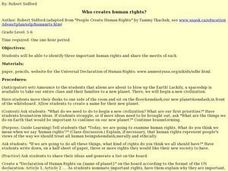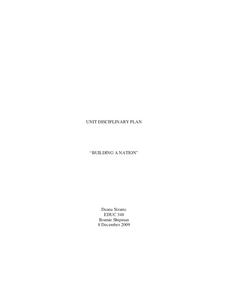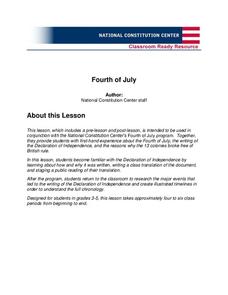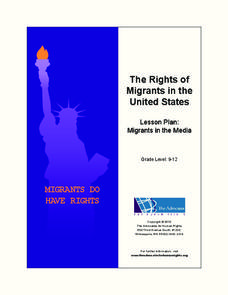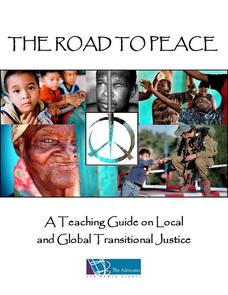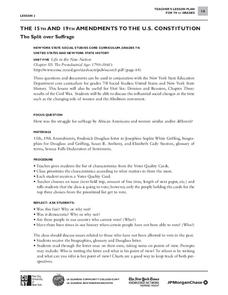NPR
Civil Rights of Japanese-American Internees
Prompted by a viewing of Emiko and Chizu Omori’s Rabbit in the Moon, a documentary about the internment of Japanese-Americans during World War II, high schoolers examine a series of documents, including the Bill of Rights and the UN’s...
Curated OER
Who Creates Human Rights?
Students examine the importance of human rights. They participate in a simulation of starting a new civilization on another planet, create a class "Declaration of Human Rights," and write a journal entry based on class discussion...
Curated OER
Building A Nation
Students build their own nation in groups where they create a name, flag, declaration of independence, form of government, mathematical layout, and more. In this nation lesson plan, students also provide a scale drawing of their nation...
Advocates for Human Rights
Human Rights Defined
Class members continue their investigation of the factors that influence migration with a lesson on human rights. As they examine the Universal Declaration of Human Rights and selected US Constitutional Amendments, learners compare the...
Curated OER
US Constitution
Think about the Bill of Rights and the Declaration of Independence with your budding historians. They analyze the importance of historical documents by examining several famous documents, and then they complete activities that check...
National Constitution Center
Fourth of July (Grades 3-5)
Bring history to life for your young scholars with a Fourth of July lesson series. After a class reading of the Declaration of Independence, students translate this pivotal document into layman's terms before working in small groups to...
Advocates for Human Rights
Migrants in the Media
Class members examine two documents—The Universal Declaration of Human Rights and The Rights of Migrants in the United States—and then use reports in the media to assess how well the US is doing in ensuring these rights.
Curated OER
The Declaration of Independence
Students identify and examine the Declaration of Independence and ascertain its true intent and its eventual realization. Then they analyze the Declaration of Independence and summarize the intentions of the Declaration. Students also...
Advocates for Human Rights
A Teaching Guide on Local and Global Transitional Justice
The Road to Peace introduces learners to the concept of transitional justice, a process where nations examine the causes of conflict, identify abuses, and use this information to develop a plan to transition to a society that upholds...
Equality and Human Rights Commission
How Do Human Rights Work?
Do human rights apply to children? Scholars learn of three children asking for help to determine their rights and how to handle specific situations. Class members must research any laws pertaining to the requested right and how the...
Curated OER
The Supreme Court: The Judicial Power of the United States
Students investigate some basic facts about the Supreme Court by examining the United States Constitution and one of the landmark cases decided by that court. The operation of the Supreme Court forms the focus of the lesson.
What So Proudly We Hail
The Meaning of America: Freedom and Religion
The United States of America was founded on firm ideals of both the pursuit of happiness and a spirit of reverence. Through a close reading of Nathaniel Hawthorne's "The May-Pole of Merry Mount," you can examine what some consider was a...
Humanities Texas
Primary Source Worksheet: General Washington, Letter Declaring Acceptance of the Command of the Armies of the United States
Discover what influenced president George Washington's decision in his early career to command the United States army by analyzing his formal acceptance with this primary source analysis worksheet.
Curated OER
Examining the Declaration of Independence
Learners examine the Declaration of Independence and its significance to American history. They read the document, identify America's grievances with Great Britain, and restate a part of the document in their own words.
Curated OER
Human Rights And Civil Rights
While he may not be as well known as civil rights activists such as Mahatma Gandhi, Dr. Martin Luther King, or Malcolm X, Ralph Bunche's contributions certainly made him a leader in the struggle for civil rights in the United States and...
Curated OER
The Declaration of Independence
Fifth graders participate in a discussion about the Declaration of Independence. In this Declaration of Independence lesson, 5th graders write imaginary stories in the voice of a member of the committee at Independence hall. Students...
Curated OER
The Supreme Court: The Judicial Power of the United States
Middle schoolers learn basic facts about the Supreme Court by examining the United States Constitution and one of the landmark cases decided by that court.
National Constitution Center
Fourth of July (Grades 9-12)
Class members work to translate the Declaration of Independence into their own words, as well as design a Facebook page within the context of 1776 to raise public awareness about the document and its meaning for citizens.
City University of New York
The 15th and 19th Amendments to the U.S. Constitution
Who gets to vote? Learn more about struggles for suffrage throughout United States history with a lesson plan based on primary source documents. Middle schoolers debate the importance of women's suffrage and African American suffrage...
PBS
Eleanor Roosevelt: First Lady, Diplomat, and Activist
Scholars analyze the impact Eleanor Roosevelt had on not just the nation, but also on the world. Primary sources and video clips help form a picture of the First Lady and her accomplishments. As a final activity, individuals create...
Australian Human Rights Commission
An Introduction to Human Rights and Responsibilities
How are your students' rights protected? What are their responsibilities in protecting the rights of others? A lesson plan on human rights and the responsibilities therein introduces class members to the concepts of global citizenship,...
Curated OER
Documents of Natural Rights: The Declaration of Independence and The Plan of Delano
Eighth graders analyze the philosophy of government in the Declaration of Independence. As a class, they discuss how this philosophy has caused other revolutions in history and how well it supports our natural rights. In groups, they...
Curated OER
Our National Documents
Students explore the significance of National Documents. In this National Documents instructional activity, students read handouts regarding the Declaration of Independence, the U.S. Constitution, and Bill of Rights. Students complete...
Curated OER
Building a Nation
Eighth graders identify the main ideas of the U.S. Declaration of Independence. They read and discuss text, read and summarize a section of the Declaration of Independence in small groups, and write a paper on why the colonists felt it...



